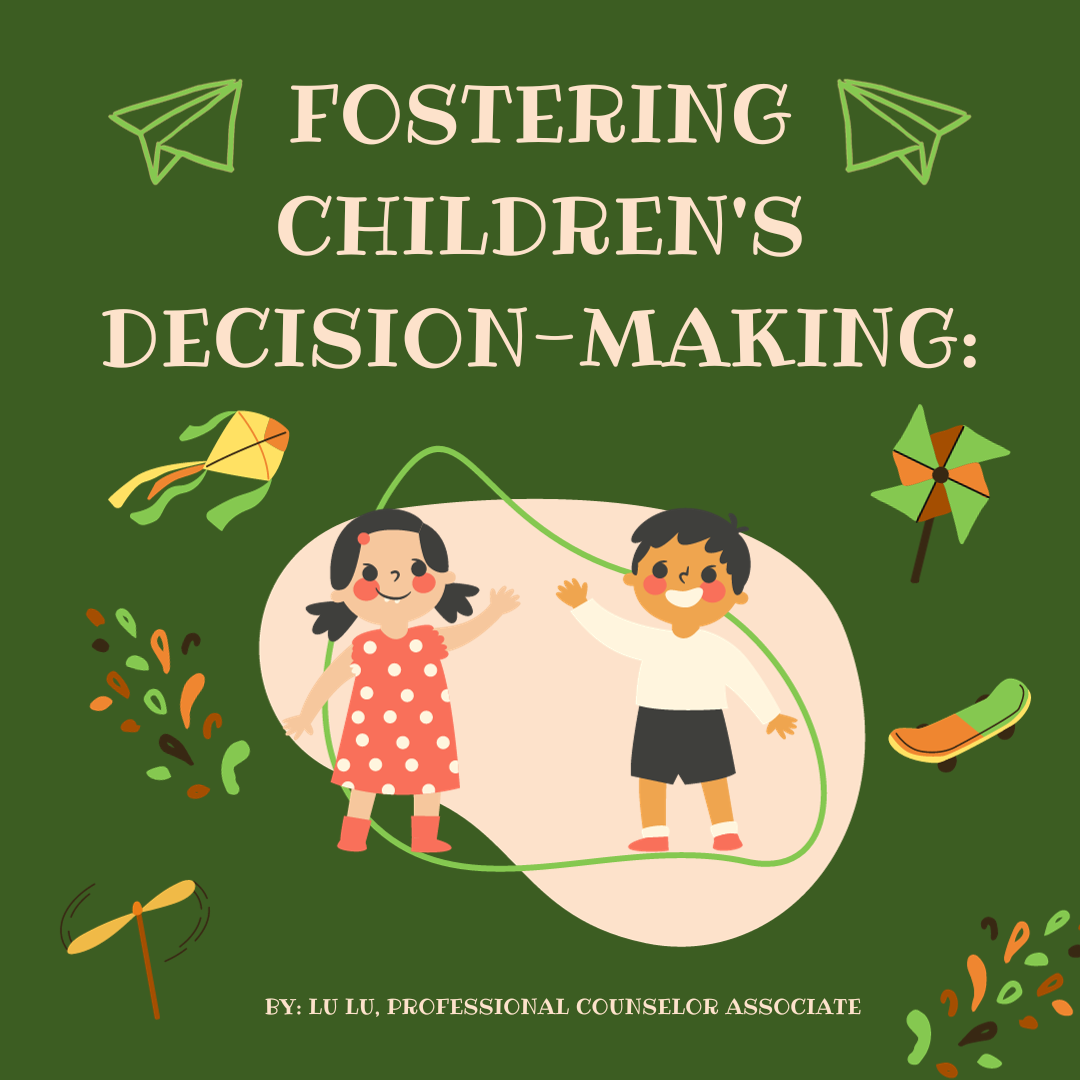This post was thoughtfully written by Lu Lu, Professional Counselor Associate. Check her profile out to learn more about her!
Part I: Empowering Them as Independent Choosers:
In our fast-paced world, filled with an abundance of choices, it’s easy to feel overwhelmed. This is no different for children, who are often faced with a multitude of decisions throughout their day. While it’s important for adults to guide them, it’s equally crucial to empower them to make choices and understand the consequences that come with those choices. In this article, we’ll
explore the concept of empowering children to make decisions by letting them experience the direct consequences of their choices, highlighting the benefits and providing a real-life example.
The Power of Choice:
Allowing children to make choices, even small ones, empowers them and helps develop their decision-making skills. When children have the opportunity to choose, they gain a sense of control and responsibility. This, in turn, boosts their confidence and self-esteem. However, it’s equally important that they experience the outcomes of their choices firsthand.

Imagine a scenario where a child is
given two cups to choose from for their morning juice: a red cup and a blue cup. The child chooses the red cup. As a parent or caregiver, you honor their choice and pour the juice into the red cup. The child takes a sip and realizes that the red cup has a small crack, causing the juice to leak. At this point, you could step
in and correct the situation by offering the blue cup. However, a valuable lesson can be learned by allowing the child to experience the consequences of their choice. They might spill some juice, get frustrated, or even ask for the blue cup themselves. In any case, they are learning the cause-and-effect relationship between their choice (the red cup) and the outcome (juice leaking).
Teaching Responsibility and Accountability:
Experiencing consequences is a powerful way for children to learn responsibility and accountability. When they understand that their choices have direct outcomes, they begin to think more critically about the decisions they make. Over time, this helps them become more responsible individuals who are mindful of the consequences of their actions (I will talk more on part II).
Fostering Problem-Solving Skills:
Furthermore, allowing children to navigate the consequences of their choices encourages them to develop problem-solving skills. In our example, the child might decide to drink the juice quickly to minimize the leakage, ask for a paper towel to clean up, or even suggest using a different cup next time. These actions demonstrate the child’s ability to adapt and find solutions—a valuable skill that will serve them well throughout life (refer to Part III for more info).
Conclusion:
Empowering children to make choices and experience the consequences of those choices is an essential part of their development. It teaches them responsibility, accountability, and problem-solving skills, while also boosting their self-confidence. As adults, our role is to guide and support them on this journey, offering guidance when necessary but also allowing them the space to learn from their decisions. So, the next time your child chooses the red cup, remember that it’s not just about the cup—it’s an opportunity for them to grow and learn from the experience.
Part II: Teaching Responsibility and Accountability
One of the fundamental life skills we aim to impart to our children is the sense of responsibility and accountability. Allowing them to experience the consequences of their choices is an invaluable part of this process. When children understand that their actions lead to specific outcomes, they begin to grasp the concept of responsibility. Responsibility is not just about completing chores or meeting obligations; it’s about recognizing the impact of their choices on themselves and others. By letting children see how their decisions directly influence the world around them, we help them develop a deeper sense of responsibility. For instance, if a child chooses to spend their time playing rather than completing their homework, they may face the consequence of having to rush through their assignments or facing academic challenges. Through this firsthand experience, they learn that their choices have tangible effects on their education and future opportunities.
Imagine a teenager named Alex who is passionate about playing the guitar. He joins a school band, and they are scheduled to perform at the school’s annual talent show. Leading up to the event, Alex is given the responsibility of practicing a particular song segment. However, instead of dedicating time each day to practice, he chooses to spend his afternoons playing video games and hanging out with friends. The day of the talent show arrives, and during the performance, it becomes evident that Alex is not well-prepared. His segment is out of tune and not in sync with the rest of the band. The performance doesn’t go well, and the band members are disappointed. From this experience, Alex learns the importance of honoring commitments and the direct consequences of his choices. Not only did he let himself down, but he also affected the overall performance of the band. This serves as a valuable lesson about responsibility and the ripple effect one’s actions can have on others and on personal growth.
Accountability is closely linked to responsibility. It involves taking ownership of one’s actions, acknowledging the outcomes, and learning from both successes and mistakes. When children are accountable for their choices, they become more reflective and self-aware individuals. They understand that it’s perfectly normal to make errors but that it’s equally important to take responsibility for rectifying them. Accountability is a cornerstone of personal growth and maturity. While responsibility deals with the duties and tasks that one is expected to perform or uphold, accountability goes a step further to ensure that one is answerable for the results of those actions, regardless of their nature. It’s the recognition that every choice we make, every action we take, has a consequence – either positive or negative – and that we must own those consequences.
The beauty of accountability lies in its transformative power. By acknowledging our shortcomings or errors, we open ourselves up to learning and growth. This acceptance serves as a catalyst for self-improvement and fosters a sense of integrity. Over time, being accountable builds trust with others, as they come to see us as individuals who stand by their words and actions. Moreover, when children practice accountability from a young age, they cultivate a strong moral compass. They learn the value of honesty, not only with others but with themselves. This internal honesty helps them navigate life’s challenges with a clearer perspective, enabling them to make decisions that align with their core values.
Let’s see a story. Lily, a fifth-grader, worked on a group project about marine life. She was responsible for the section on dolphins. On the day before submission, she realized she had misplaced her notes and hadn’t started her part. Instead of making excuses or blaming external factors, Lily approached her teacher and explained the situation. She acknowledged her oversight and asked for an additional day to complete her section, promising to work on it diligently. Her teacher, appreciating her honesty, allowed her an extension. Lily stayed up late, researched thoroughly, and produced a well-prepared section on dolphins. She not only learned about marine life but also experienced the importance of being accountable. Her teammates respected her more for her honesty and commitment, and her teacher admired her maturity in handling the situation. This incident taught Lily that while mistakes are natural, it’s how we address and learn from them that truly defines our character.
By allowing children to experience the consequences of their choices, we equip them with the tools needed to navigate life’s challenges with maturity and wisdom. They learn that their decisions have real-world implications, which encourages them to think critically before making choices. Moreover, this process fosters empathy as they come to appreciate how their actions can
affect the feelings and well-being of others. In essence, teaching responsibility and accountability through the vehicle of consequences is not about punitive measures; it’s about providing children with the opportunity to learn and grow. It sets the stage for them to become conscientious, compassionate, and well-rounded individuals who can make informed choices and face the outcomes with grace and resilience.
Part III: Fostering Problem-Solving Skills
Encouraging children to make choices and face the consequences of those choices is a powerful
method for nurturing their problem-solving abilities. Problem-solving is a vital life skill that transcends childhood and is applicable to various situations throughout one’s lifetime. Here’s how allowing children to experience the outcomes of their decisions contributes to the development of robust problem-solving skills:
- Critical Thinking: When children are confronted with the consequences of their choices,
they are compelled to think critically. They start asking questions like, “What went
wrong? Why did this happen? How can I fix it?” This line of inquiry triggers their
analytical thinking, a core component of problem-solving. - Creativity: Problem-solving often requires creative thinking to identify unique solutions.
When a child encounters an unexpected consequence of their choice, they are prompted
to explore alternative approaches to rectify the situation. This nurtures their creativity and
encourages them to think outside the box. - Decision Analysis: Experiencing consequences teaches children to weigh the pros and
cons of their decisions. They begin to understand that choices have varying degrees of
impact and that some decisions are more favorable than others. This skill of decision
analysis is pivotal in effective problem-solving. - Adaptability: In the face of unexpected outcomes, children learn to adapt and adjust
their strategies. They realize that not all solutions work the first time and that it’s okay to
modify their approach when circumstances change. Adaptability is a hallmark of
effective problem-solvers. - Persistence: Problem-solving often involves encountering setbacks and failures along the
way. When children are given the opportunity to confront the consequences of their
choices, they develop persistence. They understand that perseverance is key to finding
solutions, even in the face of adversity. - Empowerment: Allowing children to be part of the problem-solving process empowers
them. They learn that they have the capability to address challenges and make
improvements. This sense of empowerment bolsters their confidence and willingness to
tackle future problems. - Conflict Resolution: Many problems in life involve interpersonal conflicts. When
children are encouraged to take responsibility for their actions and their consequences,
they also learn about conflict resolution. They develop communication skills to address
conflicts, apologize when necessary, and work collaboratively to find solutions.
In sum, fostering problem-solving skills in children through the experience of consequences is a
multifaceted approach. It cultivates critical thinking, creativity, adaptability, and other essential
qualities that prepare them to face the complexities of life. Moreover, it instills in them the
confidence that they can confront challenges, learn from their experiences, and develop
innovative solutions to navigate the world around them successfully. We will have further
discussion on the above three in this blog.







